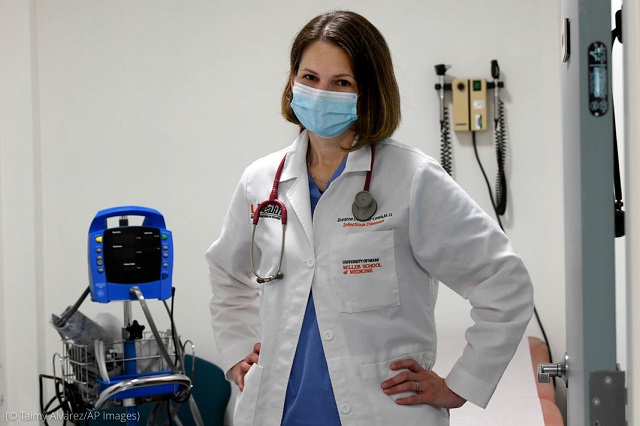Scientists are now testing several vaccines in clinical trials to find out if they are safe and effective in preventing COVID-19.
Their goal is to help break the cycle of disease transmission of SARS-CoV-2, the novel coronavirus that causes COVID-19.
“Large-scale vaccine trials are critically important,” says Lieutenant Colonel Melinda Hamer, director of the Clinical Trial Center at the Walter Reed Army Institute of Research, which is conducting several COVID-19 vaccine trials. “They are really what we call the pivotal step, or the final step, in the process to evaluate a vaccine. They allow the Food and Drug Administration to determine if a vaccine is safe and effective enough to be licensed for widespread use in the population.”
Widespread use has the potential to achieve herd immunity, which occurs when enough people become immune to a disease to make its spread unlikely.
Vaccines, step by step

“It’s really important that this vaccine work for everyone, or if it doesn’t, that we understand why,” says University of Miami’s Dr. Susanne Doblecki-Lewis, who leads research on a Moderna COVID-19 vaccine trial. (© Taimy Alvarez/AP Images)
In the exploratory and preclinical phases, vaccines are developed and then tested in animals.
In the United States, if these results provide enough information about how the vaccine works and whether it is likely to be safe and work well in humans against infectious disease, the vaccine developers request permission from the FDA to test the vaccine in clinical trials.
Human clinical trials — conducted to determine if a vaccine is safe and effective in people — generally involve three phases.
In Phase 1, a small group of volunteers (typically several dozen) receives the vaccine so that investigators can evaluate its safety at various doses. Investigators determine if there are adverse reactions with increasing doses and, if possible, gain early information about the extent of the immune response a vaccine generates.
In Phase 2, several hundred volunteers in randomized, controlled studies receive either the vaccine or a control, such as a placebo or another FDA-approved vaccine. Here, investigators continue to look at safety — for instance, short-term side effects and risks — and seek initial information regarding the effectiveness of the vaccine.
In Phase 3, the vaccine is generally given to thousands of volunteers. (Some vaccine clinical trials have included many thousands, such as is occurring with the COVID-19 vaccine trials, which include tens of thousands.) This phase focuses on efficacy, or the ability to prevent a disease, by comparing the vaccinated people to a control group (people who receive a placebo or another FDA-approved vaccine). “We expect to see fewer cases of clinical disease in the people who receive the vaccine versus those who got the placebo,” says Richard M. Novak, who leads a Phase 3 trial at the University of Illinois at Chicago of an mRNA vaccine developed by Moderna.
Novak says that it’s important for the COVID-19 vaccine trials to include diverse populations. “Here in the United States, the coronavirus infections are disproportionately occurring in people of color, and therefore, it’s really important that we test the vaccine in diverse groups of people,” he says.
Once a vaccine manufacturer has successfully completed its development program and generated adequate safety and effectiveness data, it can apply to the FDA for approval to distribute and market the vaccine in the U.S. The FDA evaluates the data, within prescribed timelines, to determine if it has demonstrated that the vaccine is safe and effective for its use.
In the case of COVID-19 vaccines, investigators can also apply for an emergency use authorization, which is justified in certain cases, such as during a public health emergency. (In such cases, statutory requirements must be met before the FDA weighs known benefits against known and potential risks of the product.)

Seattle resident Jennifer Haller, right, was among the first Americans to receive a trial dose of a COVID-19 vaccine. Haller, shown walking with her son Hayden and their dog, encourages others to join vaccine trials. (© Ted S. Warren/AP Images)
Hamer says the speed at which COVID-19 vaccines are being developed is unprecedented. “We’re seeing multiple vaccines go through preclinical, to the first human trial, to the pivotal Phase 3 trials all in the space of less than a year. It’s astounding,” she says. “The FDA has really helped to work with these teams to make sure that their trial designs are safe and generate the needed data, but also that they can be conducted in the fastest way possible.”
Even after a vaccine is in widespread use, scientists and the federal government will continue to monitor its safety and effectiveness.
Novak notes ongoing and important questions: “How durable is the immune response to the vaccine? And does the vaccine continue to protect people for a couple of years?”
“We won’t know that unless we look at people over a longer course of time,” he says.
Freelance writer Linda Wang wrote this article.
Banner image: Neal Browning, one of the first Americans to receive a trial dose of a COVID-19 vaccine, rides his bicycle in Bothwell, Washington. By July, 150,000 Americans had volunteered for other vaccine studies, according to a virologist at the Fred Hutchinson Cancer Research Center in Seattle. (© Ted S. Warren/AP Images)







COMMENTS0
LEAVE A COMMENT
TOP